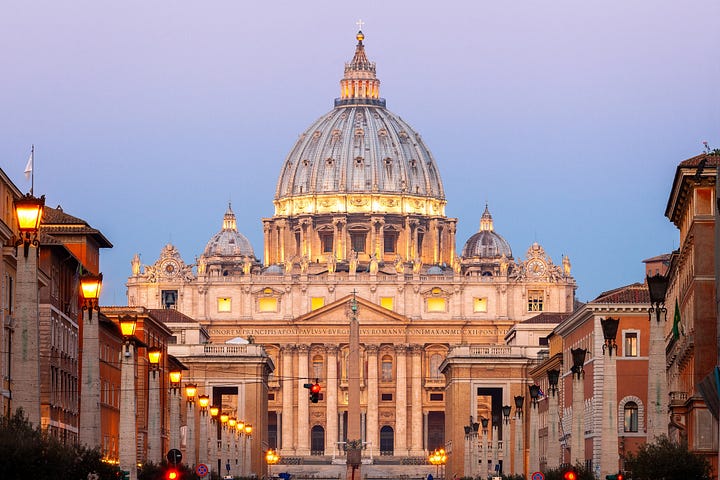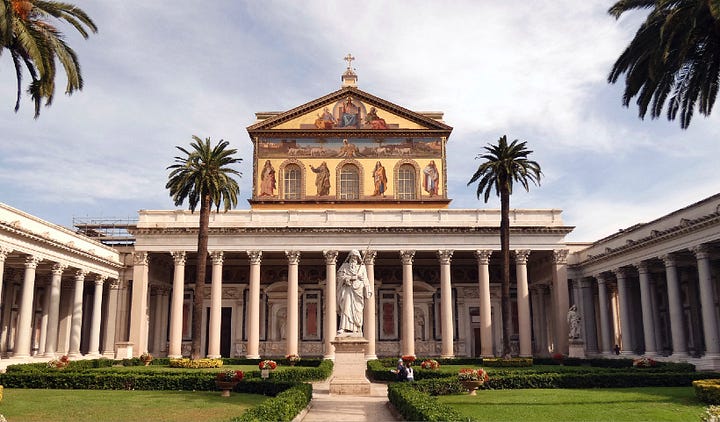We'll have to wait a little longer for a new Liturgy of the Hours
Plus: An anti-stupid song
Good morning and happy Saturday. Today is the optional memorial of the Dedication of the Churches of Sts. Peter and Paul. These two basilicas were built under Pope Sylvester and Pope Siricius in the fourth century. Similar to how we celebrate the dedication of the Basilica of Mary Major, we celebrate the dedication of the churches of, perhaps, the most important apostles. The description in the currently published editions of the Liturgy of the Hours goes as far as to call them “the two princes of Christ’s apostles.”


This week we are entering the thirty-thrid week in Ordinary Time. The readings for this Sunday are Proverbs 31:10-13, 19-20, 30-31; Psalm 128:1-2, 3, 4-5; 1 Thessalonians 5:1-6; and Matthew 25:14-30.
Here is a calendar for the week:
Tuesday, November 21st - Memorial of the Presentation of Mary
Wednesday, November 22nd - Memorial of St. Cecilia
Thursday, November 23rd - Memorial of St. Clement I (optional) or Memorial of St. Columban (optional) or Memorial of Blessed Miguel Agustín Pro (optional)
Friday, November 24th - Memorial of St. Andrew Dũng-Lạc and Companions
Saturday, November 25th - Memorial of St. Catherine of Alexandria (optional)
Now, here are a couple of notes on this week’s calendar. Several of these memorials are not in the currently published editions of the Liturgy of the Hours. Here is the commons you can use:
Blessed Miguel Agustín Pro - Common of One Martyr or Common of Pastors
St. Andrew Dũng-Lạc and Companions - Common of Several Martyrs
St. Catherine of Alexandria - Common of One Martyr or Common of Virgins
This week also has our civic holiday Thanksgiving. While there are readings for use at Mass on Thanksgiving, we do not currently have a proper for the Liturgy of the Hours. At Mass, the readings are actually pulled from a part of the lectionary called “Masses for Various Needs and Occasions, Section III: In Various Public Circumstances.” The USCCB publishes a selection of these on their website, but here are all of the options you could hear on Thursday:
First reading:
1 Kings 8:55-61
Sirach 50:22-24
Isaiah 63:7-9
Zephaniah 3:14-15
Psalm:
1 Chronicles 29:10bc, 11, 12
Psalm 113:1-2, 3-4, 5-6, 7-8
Psalm 138:1-2a, 2bc-3, 4-5
Psalm 145:2-3, 4-5, 6-7, 8-9, 10-11
Second reading:
1 Corinthians 1:3-9
Ephesians 1:3-14
Colossians 3:12-17
Gospel:
Matthew 7:7-11
Matthew 11:25-30
Mark 5:18-20
Luke 1:39-55
Luke 10:17-24
Luke 17:11-19
John 15:9-17
John 16:20-22
So if you’re not going to Mass on Thursday (it is not a holy day of obligation), take some time between eating turkey and watching the Lions crush the Packers (that game is on FOX if you’re wondering) to reflect and give thanks to God for the blessings he has bestowed on us and our nation.
If you’re like me and you like seeing propers in the Liturgy of the Hours for civic holidays, do not be anxious. JD Flynn reported in the Pillar this week that bishops voted this week to approve a “proper second reading” for the Office of Readings on Thanksgiving as well as two other civic holidays.
There has been a lot of buzz around the Liturgy of the Hours of late and I am pleased about that. The Divine Office, as it is also called, is getting a lot of attention and promotion by both prelates and laity as a method of staying connected to the Church spiritually and sanctifying the day to our Lord.
In Matthew 6:7, Jesus tells us, “In praying, do not babble like the pagans, who think that they will be heard because of their many words.” When we pray, do we babble? Do we rattle off a long list of needs and wants?
The Liturgy of the Hours provides us an opportunity to actually pray with the words of God. The Psalms are the prayers that Jesus prayed and recited, even until his death on the cross.
Additionally, the Liturgy of the Hours provides us an opportunity to consecrate the day. The General Instruction on the Liturgy of the Hours spends its first few paragraphs detailing the prayer life of Jesus. It says, “[Jesus’] daily activity was closely bound up with prayer, and may be said to have flowed from it; we see this when he went into the desert or the hills to pray; we are also told that he rose early in the morning to pray, and that he even spent the night in prayer to God, remaining until the fourth watch.”
When we follow the Liturgy of the Hours, we provide praises to God in our morning prayer; this hour is traditionally called Lauds which is Latin for “praises.” Then in the evening, “we may give thanks for what has been given us during the day, or for the things we have done well during it,” as St. Basil the Great says. Just these two hours alone help us sanctify the day and orient it more toward our Lord.
Want to read more of the Bible? Pray the Office of Readings. Prior to the Second Vatican Council, the Office of Readings was called Matins and was generally prayed in the middle of the night. The General Instruction says, “The Fathers and spiritual writers have very often exhorted the faithful, especially those who lead a contemplative life, to pray at night.” The old Matins were as long as twelve Psalms, three scriptural readings, and three patristic readings on Sundays.
Because the Church wanted to extend more of her liturgical celebrations to the laity, Matins was shortened and formatted so that it could be prayed at any time of day. That being said, many (myself included) add it to the beginning of morning prayer.
The Office of Readings includes three psalms (or three sections of a particularly long psalm), a scriptural reading, and a patristic reading generally relating to the reading or the saint of the day. Additionally, the Office of Readings does not follow the readings we hear at Mass. This week, read from the book of Daniel and the visions he received from angels. As we prepare to enter Advent, we’ll be reading a lot from the book of Isaiah and the pending incarnation of our Lord.
Finally, when we pray the Liturgy of the Hours, we unite ourselves with the entire Church throughout the world in our prayers of praise and thanksgiving to God.
The Church historian Ormund Rush wrote in The Vision of Vatican II: Its Fundamental Principles that it generally takes the Church about a hundred years to fully realize the effects of an ecumenical council. Now that we are more than halfway into that century, I think we are starting to realize the importance and value of the Liturgy of the Hours.
Cardinal James Stafford (Denver, Colorado, retired) said ahead of a 2022 live stream on the Liturgy of the Hours that the Divine Office provides an opportunity “to give priority to numero uno — to God the Father through Jesus” and it “is central to the spiritual life of the family.”
Bishop Robert Barron’s (Winona-Rochester, Minnesota) Word on Fire organization has been publishing a subscription service for the Liturgy of the Hours for those who are a bit overwhelmed by the constant page turning in the published editions of the brievery. Nb: This version only contains Morning Prayer, Evening Prayer, and Compline.
If you want to pray it online for free, there are great versions from both DivineOffice.org and Universalis. Nb: DivineOffice.org uses the American version of the Divine Office. Universalis’ free version uses their own translations of the Psalms and canticles for copyright reasons. The paid version uses the New Jerusalem Bible and the version of the Liturgy of the Hours used in the United Kingdom.
Have I got you hyped up for routine, daily prayer? I would not stop you if you wanted to go out and buy the four-volume set of the Liturgy of the Hours. I will caution you, however, with the story that started this whole column: the American bishops are working on a new version.
The primary reason for this is that, like the original Mass published in 1975 there are some significant errors in the English translation being used in the United States. The Mass, as you may recall, was revised in 2010 with some significant changes to the Gloria and the Sanctus, and some minor changes to the Niacene-Constantinopolitan Creed and the Angus Dei.
Conception Abbey in Missouri has been tasked with retranslating the Psalms and Canticles, which they have already done. That book is available in print from the USCCB and, thanks to a seminarian friend of mine who gave me a copy, I can say the new translation is truly a work of art.
I also suspect we’ll see some significant changes to the Te Deum and the addition of numerous saints to the Proper of Saints.
The bad news is that the new four-volume version likely will not be available for purchase until 2026. This is in part because the Bishop’s conference is also working on a new translation of the New American Bible (which, except for the Psalms, is not yet complete). Then that has to be approved for liturgical use. Then the Liturgy of the Hours needs to be sent to Rome for approval; which usually takes twelve to eighteen months.
We’ll just have to be patient.
In the news:
The United States
For those who need some red: US Bishops vote to keep abortion as “preeminent priority” - The Pillar
Elderly pro-life activist charged with violations of FACE Act - Catholic News Agency
For those who need some blue: Bishop Strickland spent too much time on X - Christopher R. Alteiri in the Catholic World Report
The Vatican
Pope to Hispanic American priests: “Do not leave those who suffer alone” - Catholic News Agency
Opinion: When the Vatican Press Office makes the Pope look bad - Phil Lawler in Catholic Culture
The World
Paul McCartney, Times of Trouble, and “Let It Be” - Dr. Christopher Kaczor in Word on Fire
Mass going rates on the rise in Belgium but still down from 2017 - The Pillar
Critics ask where is St. Oscar Romero’s legacy in El Salvador? - Crux
Head of CCP-backed bishops body visits Hong Kong - Crux
If you have twenty minutes to spare this week, I would encourage you to check out this Thanksgiving classic: Arlo Guthrie’s “Alice’s Restaurant.” It is a long, deadpan parody protest song against the Vietnam draft. Although, Guthrie himself said on a CBS This Morning interview several years ago that its not an anti-war song, its an anti-stupid song. What does this have to do with Thanksgiving? The beginning of the song talks about a Thanksgiving meal he had with a woman named Alice in an abandoned church. Additionally, the song has been spun on the radio, usually after enough people request it because it is so long, pretty much every year on Thanksgiving.
I’ll point you to my column above about the Liturgy of the Hours for my weekly thoughts this week.
I hope everyone has safe travels this week as they head on the road for Thanksgiving. Enjoy spending time and food with your friends and family. Don’t forget to provide thanks to God.
And maybe we’ll have a repeat of the 1962 Thanksgiving game between the Lions and Packers:
Go Lions.
Matthew




